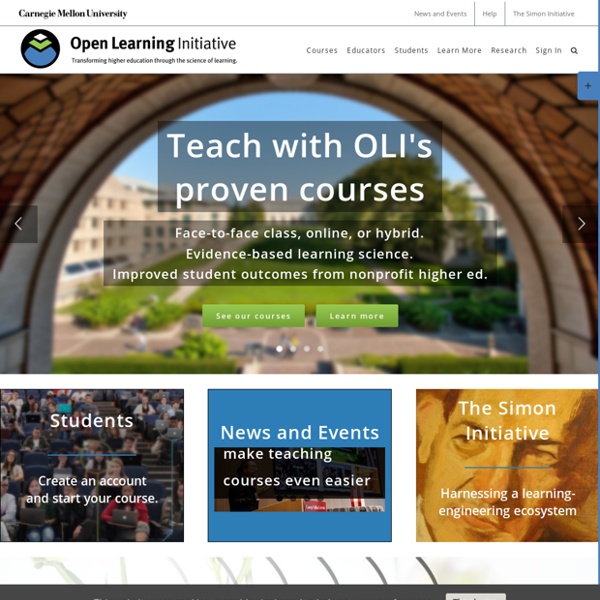



250 Free Online Courses from Top Universities Advertisment Take online courses from the world’s top universities for free. Below, you will find 1,700 free online courses from universities like Yale, MIT, Harvard, Oxford and more. Our site also features collections of Online Certificate Programs and Online Degree & Mini-Degree Programs. Note: This page includes a lot of Massive Open Online Courses (MOOCs). If you want to enroll in a free version of a MOOC, please select the “Full Course, No Certificate” (edX) or “Audit” (Coursera) option. Harvard Open learning initiative At Harvard Extension School, free and open learning is hardly a new concept. In fact, the Extension School was founded with this mission in mind: to create an affordable way for any motivated student to take courses at Harvard. We stay true to this mission today, offering several free courses and nearly 800 for-credit courses at reasonable tuition rates. Explore our series of free or low-cost courses below. In addition, you can also browse Harvard University's Digital Learning Portal, which features online learning content from across the University, both free and fee-based options.
25 Free Lifelong Learning Resources The Internet has made the lifelong pursuit of knowledge easier for nearly everyone in the world. There are tons of websites dedicated to providing free courses, reference books, education apps, and other learning materials. Here are 25 stand-out sites that would be useful to almost any lifelong learner. Clusty – This unique search engine sorts results into clusters of related information so that it is easier to sort out the relevant from the irrelevant. 150 Free Textbooks: A Meta Collection Free textbooks (aka open textbooks) written by knowledgable scholars are a relatively new phenomenon. Below, find a meta list of 200 Free Textbooks, and check back often for new additions. Also see our online collection, 1,700 Free Online Courses from Top Universities. Art History
proyeccion de 3d a 2d - Matemáticas Son matrices, lo que ocurre es que el programa de Todoexpertos elimina los espacios. De todas formas es equivalente lo siguiente: x' = x*cos(a) -y*sen(a) y' = x*sen(a) +y*cos(a) z' = z donde a es el ángulo que rota el eje OZ. 100 Incredible Lectures from the World’s Top Scientists Posted on Thursday June 18, 2009 by Staff Writers By Sarah Russel Unless you’re enrolled at one of the best online colleges or are an elite member of the science and engineering inner circle, you’re probably left out of most of the exciting research explored by the world’s greatest scientists. But thanks to the Internet and the generosity of many universities and online colleges, you’ve now got access to the cutting edge theories and projects that are changing the world in this list below. If you’re looking for even more amazing lectures, check out our updated list for 2012 with more talks from great minds. General
News: From Classic to Modern "Fortune favors the bold” is one of those phrases that are quoted so frequently that they bear none of the weight of their original contexts. The appeal of its underlying message — luck is not something that merely happens to people, but rather the other way around — ignores the fact that it was originally written, by the Roman poet Virgil, as the battle cry of a fool whose boldness shortly leads to his death. There is a pause on the phone line as Richard Thomas, a professor of classics at Harvard University, attempts to locate the original passage. “I know this stuff, but for some reason I’m not…” Thomas trails off, preoccupied by the search. After a minute, he says he'll e-mail it to me later. Which he does, in short order.
Teaching Resources and Lesson Plans from the Federal Government FREE Features These features originally appeared on the FREE.ED.gov features blog. The features highlight resources and ideas related to holidays, awareness months, anniversaries and seasonal topics. January February UC Irvine, OpenCourseWare Paul's Online Math Notes Before we get into surface integrals we first need to talk about how to parameterize a surface. When we parameterized a curve we took values of t from some interval and plugged them into and the resulting set of vectors will be the position vectors for the points on the curve. With surfaces we’ll do something similar.
Vector Functions We first saw vector functions back when we were looking at the Equation of Lines. In that section we talked about them because we wrote down the equation of a line in in terms of a vector function (sometimes called a vector-valued function). A map of the Tricki This is an attempt to give a quick guide to the top few levels of the Tricki. It may cease to be feasible when the Tricki gets bigger, but we might perhaps be able to automate additions to it. Clicking on arrows just to the right of the name of an article reveals its subarticles. If you want to hide the subarticles again, then you should click to the right of them rather than clicking on the name of one of the subarticles themselves, since otherwise you will follow a link to that subarticle.
Paul Erdős Paul Erdős (Hungarian: Erdős Pál [ˈɛrdøːʃ paːl]; 26 March 1913 – 20 September 1996) was a Hungarian mathematician. Erdős worked with hundreds of collaborators, pursuing problems in combinatorics, graph theory, number theory, classical analysis, approximation theory, set theory, and probability theory. He was also known for his eccentric personality.[2][3] Early life, education, life, and death[edit] Paul Erdős was born to Jewish parents in Budapest, Hungary, on March 26, 1913.[4] He was the only surviving child of Anna and Lajos Erdős (formerly Engländer);[5] his siblings died before he was born, aged 3 and 5. His parents were both mathematics teachers from a vibrant intellectual community.